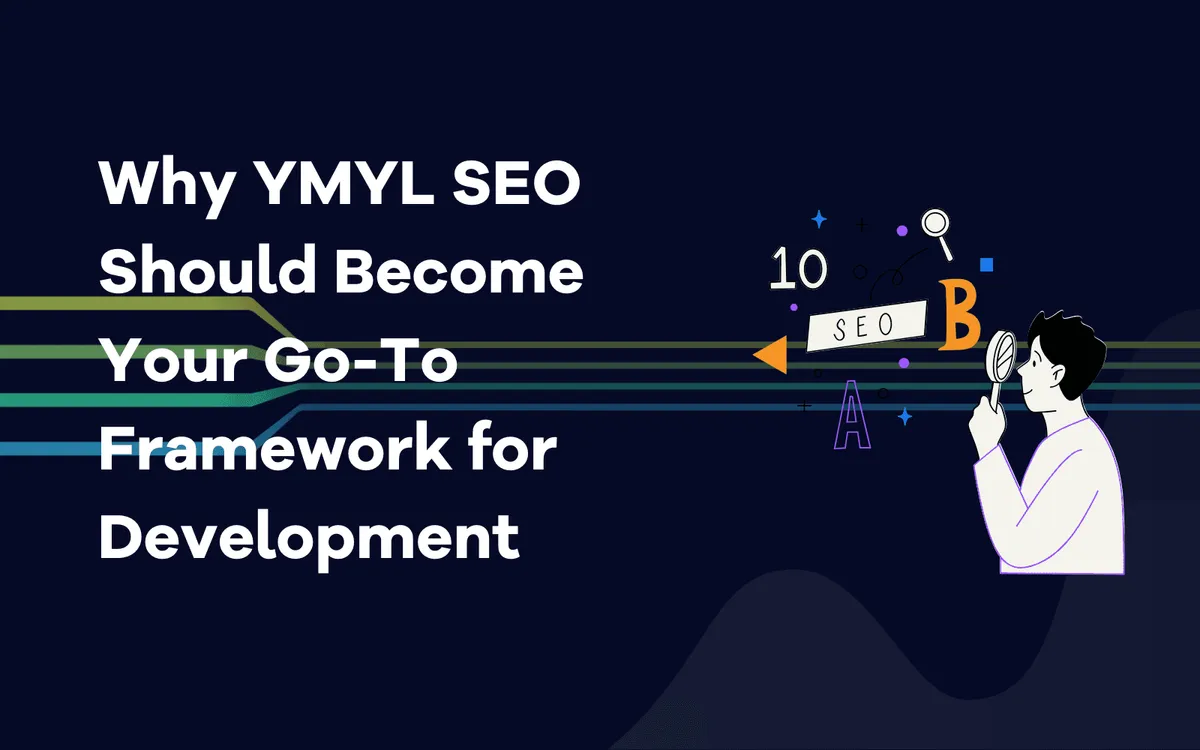
Why YMYL SEO Should Become Your Go-To Framework for Development

Christian Carere
September 5, 2023
Unlock Success with YMYL SEO: Learn Why Your Development Strategy Needs This Game-Changing Framework. Elevate Your Online Presence Today!"

As Google continues to progressively raise the bar in the quality of content, it’s important to adopt the tactics and best practices that appeal to search engines. Learn how to increase the search visibility of your website through the YMYL SEO Framework by demonstrating high levels of E.E.A.T.
Using the proper YMYL SEO framework for websites provides the perfect ingredients for establishing page quality, authority, and trust. While this is necessary for YMYL sites, why not hold some of the same standards for every website for an extra competitive edge in the search results?
For example, assume you’re ranking a plumbing website. Who would you want to write your blog posts?
a) A plumber who has been praised as revolutionizing the plumbing industry and has published white papers on plumbing technology. Or
b) A faceless writer from Upwork that writes about everything under the sun?
Obviously, it’s an extreme comparison, but if Google AND your audience know that the blog posts are from a highly credible source, that’s a massive boost in the credibility of the plumbing company and the content on the website.
It does NOT mean the posts will rank automatically. The content still has to satisfy the intent of the search and be high-quality. But in today's competitive climate where information is easily accessible, this kind of credibility can change how your content is perceived by people and search engines.
You wouldn’t gain that credibility in the search results without implementing the framework that tells search engines who your star writer is! Following the tips and tactics that demonstrate a high level of E.E.A.T. can boost your search visibility.
Does that mean E.E.A.T. is a direct ranking factor? I don’t think anyone can say that for sure…
But if you follow the principles of E.E.A.T. and do everything that makes your page incredibly useful to users, isn’t that what Google wants to show in its search results?
What exactly is a YMYL website?
YMYL is an acronym for Your Money Your Life. While it may seem like an eerie ransom note, this is not the case. YMYL content refers to websites and web pages with content that potentially has a high risk of harming a person (or having a large impact on their life). This type of content is generally found on sites that cover:
News
Health or medical information
Finance
Groups and people
Shopping information
The short list above is by no means a comprehensive list of the types of content that can be considered YMYL. There are other inclusions to make as there are many instances where content can fall under this category.
Here is a topic chart of examples of how these issues can fall into the different areas of inclusion from the Search Quality Evaluator Guideline handbook:
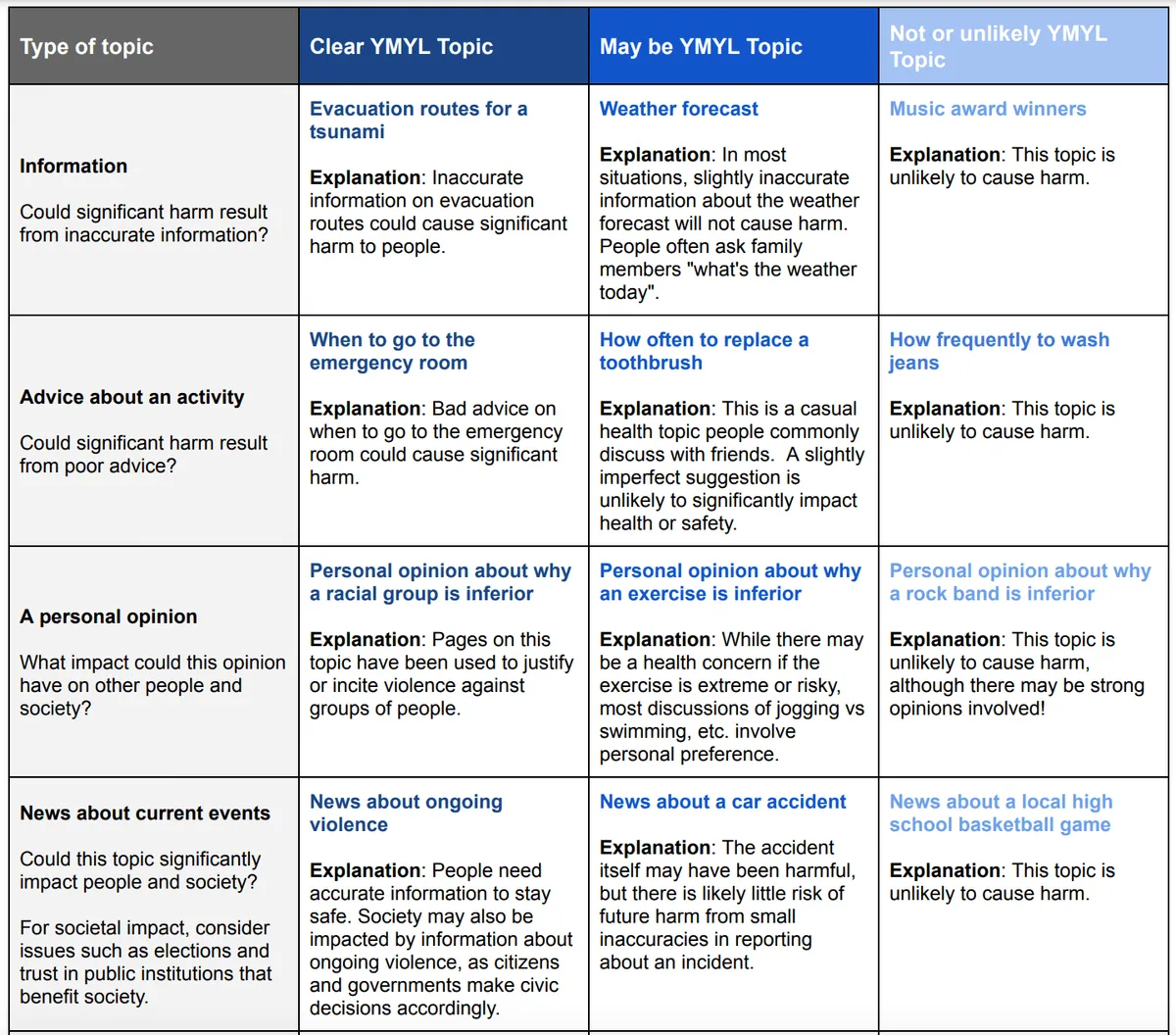
How does YMYL impact SEO strategy?
When it comes to Your Money Your Life, Google wants to show the most trustworthy and credible content on the first page of search results. It’s basically what everyone wants to see too. If you were researching Google for medical advice, would you rather read a web page written by a doctor or an affiliate marketer?
The truth is, when you have the best content, you have one of the biggest pieces of the puzzle to achieving high rankings. In most cases, writing SEO content to rank is the easy part. The more difficult aspect of YMYL SEO is proving your content is the best.
The answer: Use tactics that signal your content is credible, authoritative, and trustworthy.
To rank YMYL content, there is a specific framework that needs to be present to get results. According to Google itself, YMYL content comes under higher scrutiny for quality and credibility.
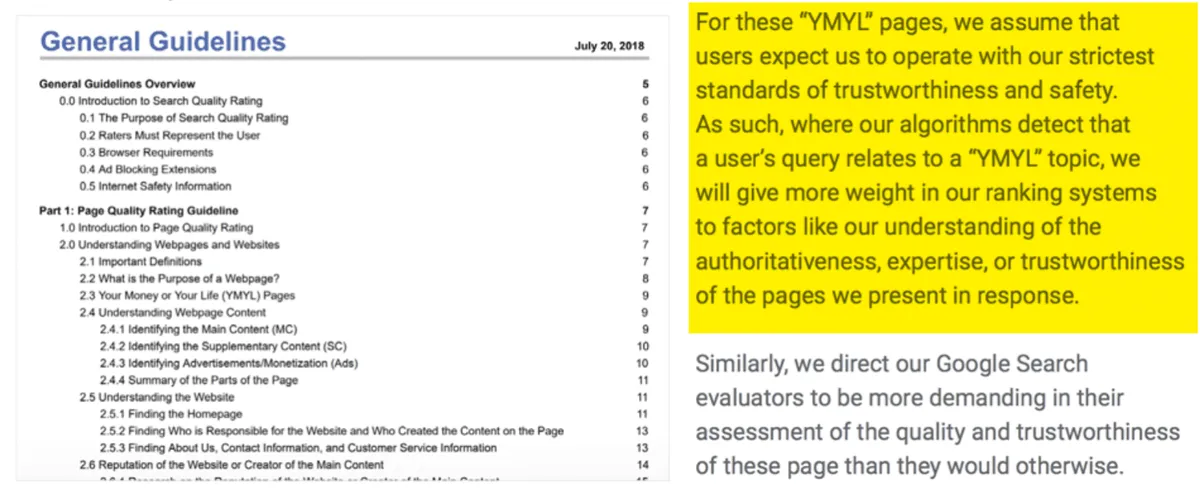
Google wants to know, “How do I know your content contains the best, most accurate, and up-to-date information?”
Despite not knowing Google’s exact algorithm, we know it’s looking for the highest quality content that’s supported factually and trusted by many. Therefore, to improve the SEO of your YMYL content, you must improve the overall page quality and demonstrate E.E.A.T.
The importance of E.E.A.T. and page quality
E.E.A.T. (Experience, Expertise, Authority, and Trust) is one of the major factors that determine page quality. Who is creating the content and are they an expert in their field?
We know this has become a vital factor for search results based on the historic updates that Google has implemented.
In 2013, Google published the Search Quality Evaluator Guidelines
In 2014, they introduced the concept of E.A.T.
In 2018, the infamous Medic update was implemented (Google Grump was furious!)
In December 2022, the additional E for “Experience” was added to E.A.T. to recognize those with valuable insights into topics based on experience.
It should be obvious how important content quality is for SEO. The Search Quality Evaluator Guidelines specifically state the most important factors that determine the quality of a page:
Clearly demonstrate and achieve a beneficial purpose of the page
Demonstrate a high level of E.E.A.T.
Main content quality and quantity
Who is responsible for the main content
Website Reputation
Ten Tips to Boost E.E.A.T. and Improve the SEO of your website
Creating a higher quality page is beneficial for every website no matter what the niche. Based on Google’s SQEG, here are some actionable tips to boost E.E.A.T. and improve the SEO of your website.
Publish actionable content with a clear purpose
Publish content to create value for your readers. Some publishers fall into the trap of writing for SEO, rather than thinking of the user first. When a user has something to gain from reading your content the purpose of your page is very obvious.
There are many times Google will crawl your site, discover your pages but choose NOT to show it on its index.

Take this example below on a psychotherapist's website. The title is laser-focused. It tells the reader exactly what they’re getting from the article for a very specific situation.
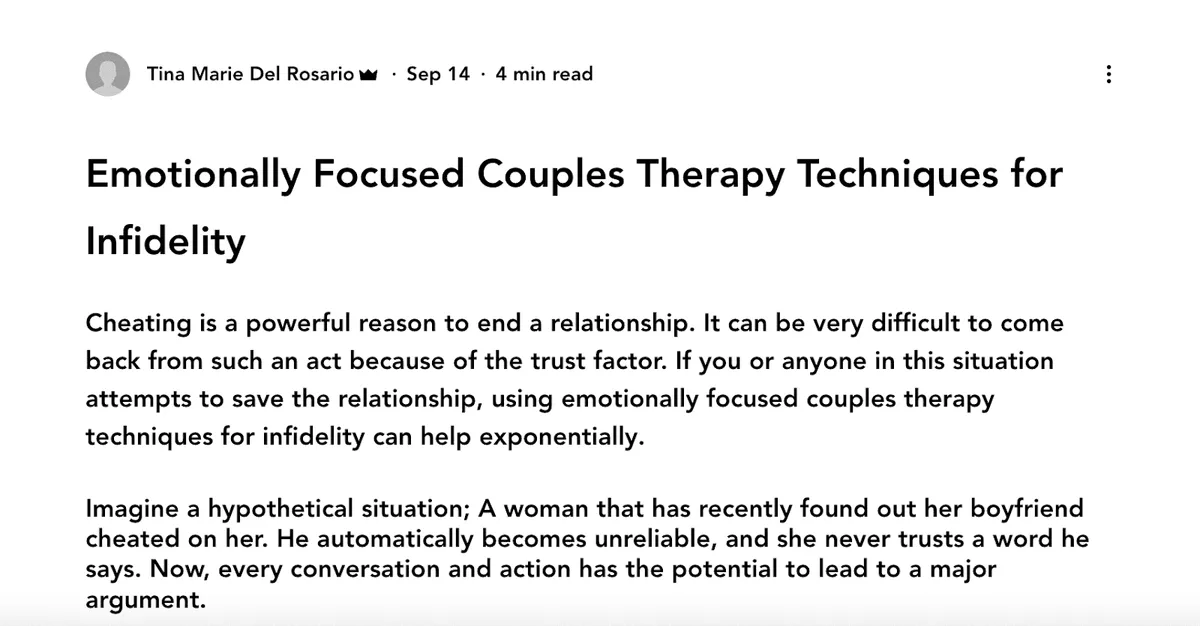
This article was published on the blog of a psychotherapist's website during the first few months of launching the website. With no backlinks, it ranks #1 partially because it nails the intent and is clearly actionable. The other BIG reason is the next tip to boost E.E.A.T.
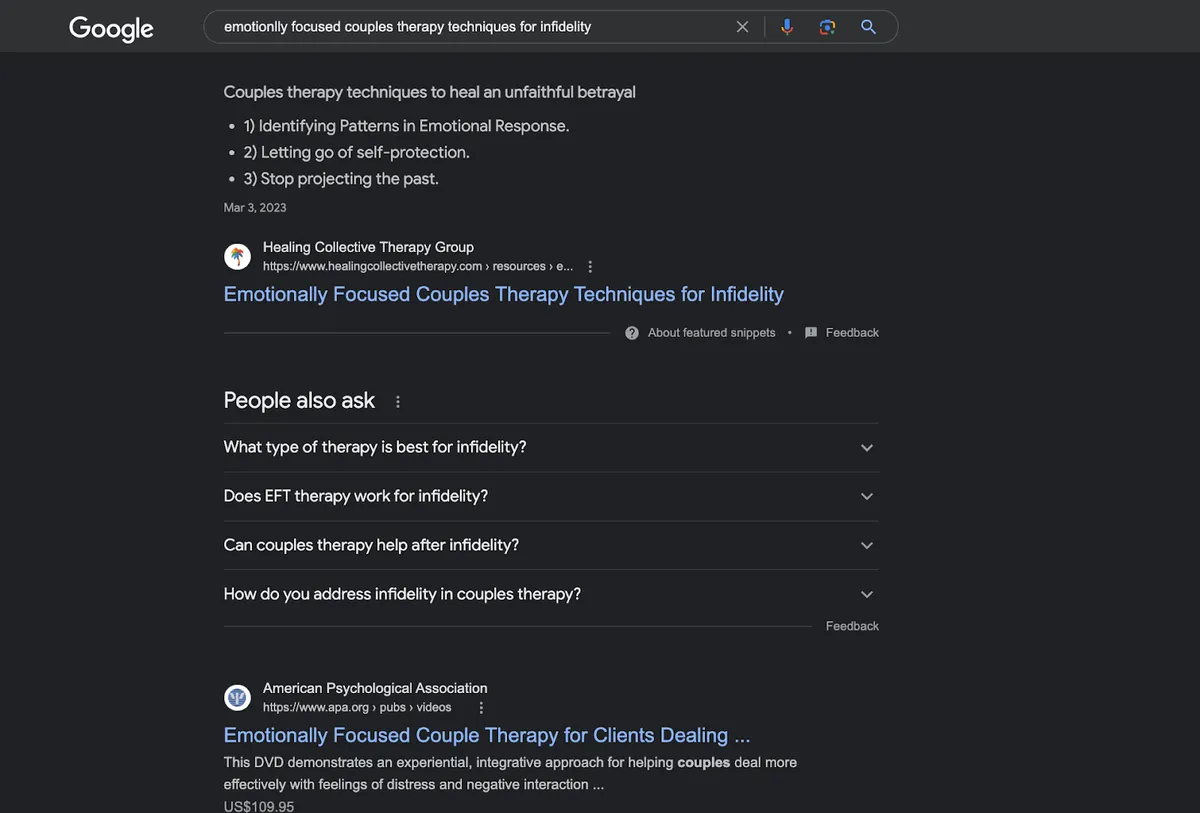
Always publish adequate information about the author/website
There are two aspects to this. One can be as simple as having a detailed “About” page. If there are multiple authors, contributors, and team members, publish a team page WITH separate author pages.
This tells users more about their background, life experience, and expertise. This also attributes any blog post or article published on the site to a particular person.
Giving users this added accessibility to the content creator's background will increase the E.E.A.T. of your website.
The example below provides all the information on a therapist that you would want to know about if you were considering her therapeutic services.
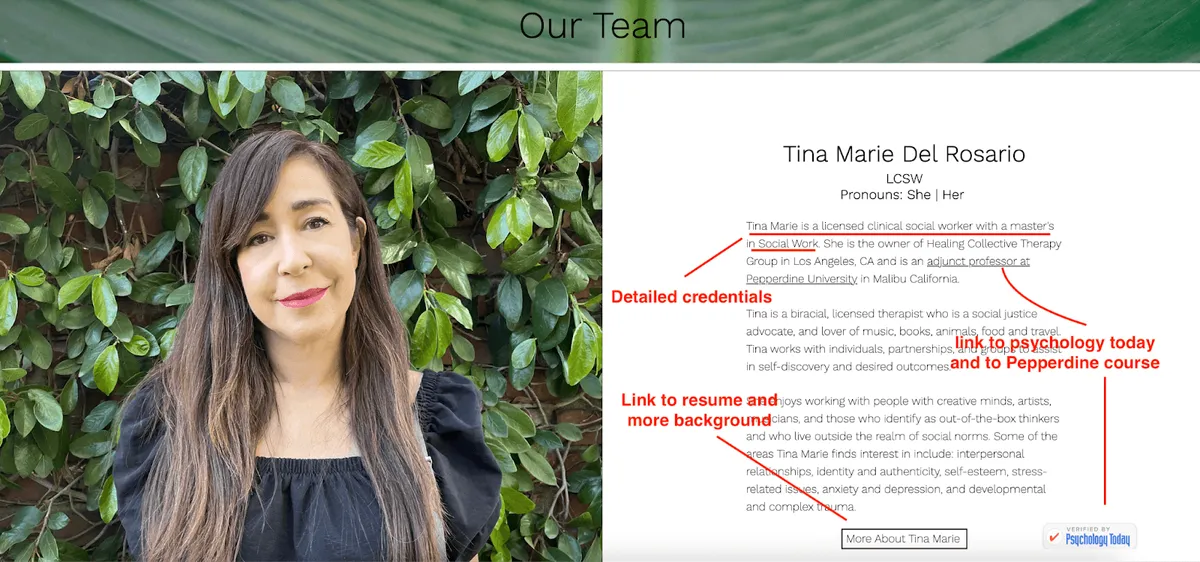
Source: Healingcollectivetherapy
Creating the team page gave this therapist a slight boost in overall keyword positions. However, in March 2023 we created the author bios and attributed the content to Tina (above) by linking it to all the blog posts (instead of being published by “admin”). This is when all of the blog posts took a major jump in keyword positions and started generating real traffic.

Want another example of how the author bios boosted our search visibility? Remember the article shown above “Emotionally Focused Couples Therapy Techniques for Infidelity”? Here’s the organic traffic chart from March, when we implemented the change:

Everything started rising the moment we started showing more E.E.A.T. or more specifically, more Expertise and Experience.
When creating author bios, include details about the author's background, credentials, expertise, experience, and social profiles. You can even link to previously published articles on well-known websites.
Publish Q&A or Frequently Asked Questions
Incorporating Q&A/FAQs on your website or within your content is a sign of expertise. It shows you’re used to answering common questions users have.
Supplying the answers to frequently asked questions is not only good for your E.E.A.T. but it’s a great way to generate traffic. Use the correct format to get your content to show up in SERP features such as featured snippets and the People Also Ask box.
You should also use FAQ Schema markup to have the option of your FAQs showing up in the search results.
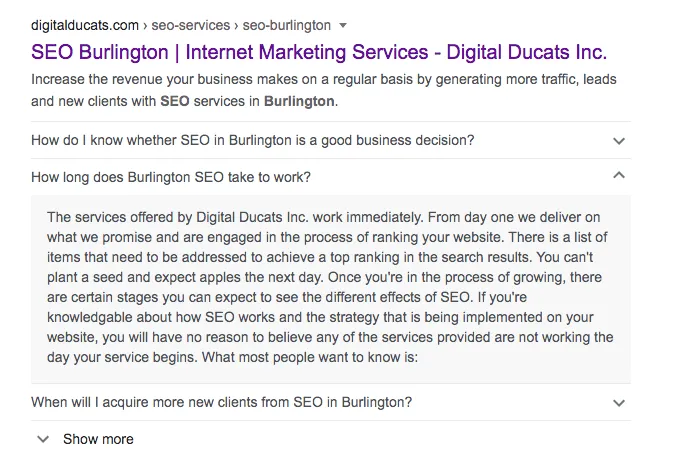
Use descriptive and accurate titles, subtitles, and descriptions
Transparency is valued in today’s culture and the same value translates to the search results. Avoid using “clickbait” for titles. Choose titles and subtitles that tell the user exactly what they’re getting out of the content to enhance the clarity of the purpose of your page.
When a user reads your title from the search results, they should be able to expect content that supports your title. When they scan through your content, the subtitles (h2-h6) should provide the reader with an overall summary of what issues and topics the page dives into.
This also helps search engines better understand the page content. An accurate set of subtitles can lead to capturing the featured snippet position and appearances in the People Also Ask box.
Avoid using excessive ads
Google prefers top-heavy content rather than top-heavy ads. They came out with a page layout algorithm update to penalize websites with too many ads above the fold.
Create content that immediately addresses the purpose of the page. Avoid excessive ads that push content further down the page. Too many ads will reduce page quality because they split the page's purpose between being beneficial and making money.
Cover a topic in its entirety
Once you’ve started a topic in a specific direction, continue until you’ve reached your destination. Be extremely detailed in the topic you’re trying to cover with regard to answering the intent of the search.
Publish content with the intent of making your page the last one a user needs to visit. This ensures your audience won’t need to go to another website because you haven’t missed a single detail.
Here’s an article titled “13 Signs You Can’t Trust Your Partner that outranks HUGE authority websites with no links because the content covers EVERYTHING!
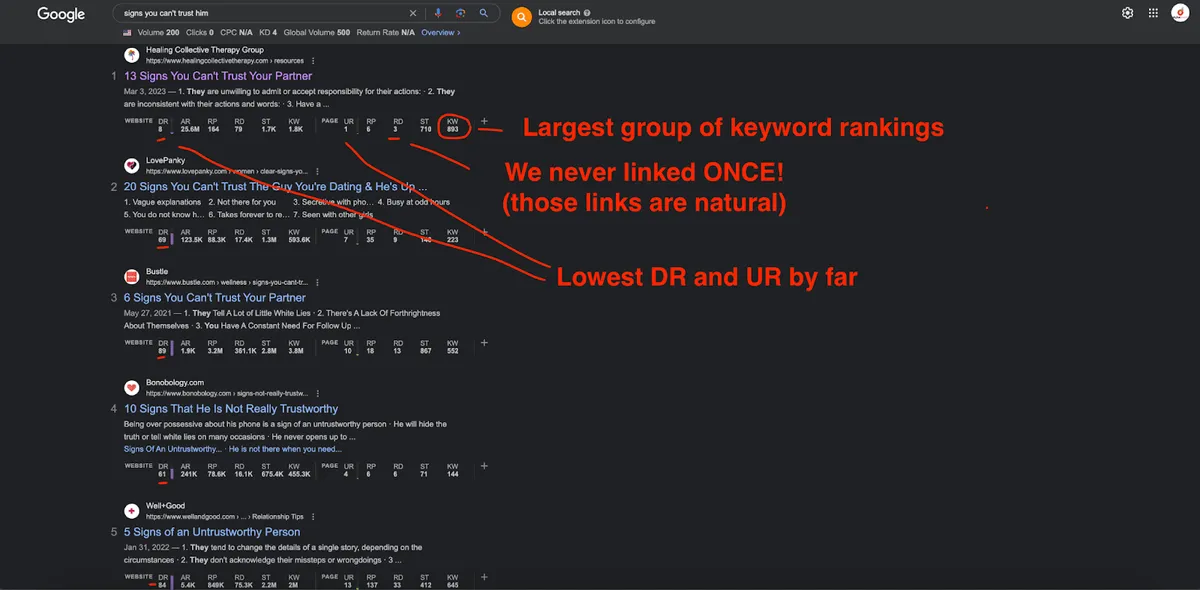
69% of successful companies have documented their B2B content marketing strategy. If your content strategy doesn’t include this aspect of content creation, you’re going to have difficulty beating the more authoritative websites.
Link to credible websites and cite all sources
Using well-known websites as sources is an excellent practice for increasing trust in your content. When a page cites sources that have already established trust and authority it’s a sign of providing a beneficial purpose for users. It also gives your content more credibility and trust.
Think of it as using the authority of another site to boost the value of your content. It’s like you’re both agreeing on the same thing. Wikipedia ranks in the masterclass for demonstrating this-which is why Google uses them almost exclusively as a point of reference.
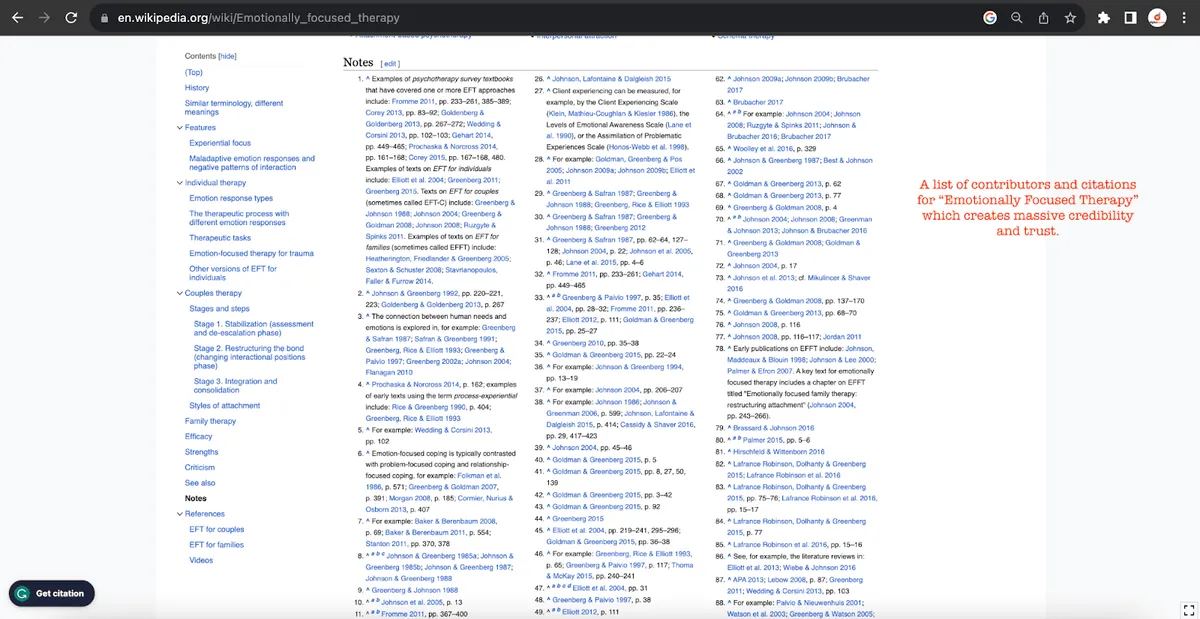
Outgoing links to your page also demonstrate your effort to help the reader to find more information than you’ve published. This improves the quality of the user's experience-especially when you’re linking to well-known and trusted websites where information isn’t easily questioned.
Demonstrate skilled and professional writing skills
If you think search engines aren’t evaluating writing skills, think again. Check your grammar, spelling, and overall level of professionalism in every piece of content. There are plenty of tools to help with that.
Grammarly is a great plugin to use for spelling and grammar.
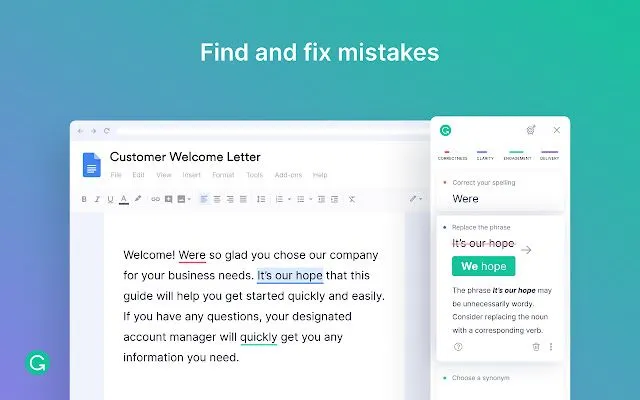
You can also use the Yoast plugin to get the Flesch reading ease score. You can follow the listed tips to boost the quality of your content.
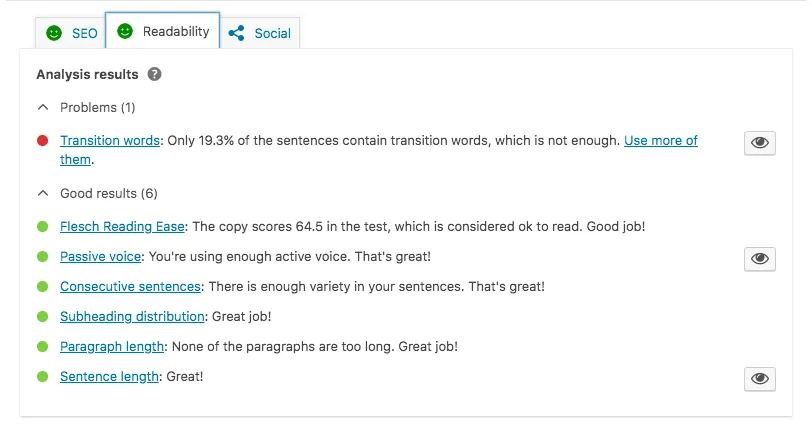
Update your content periodically
This is one of the SEO best practices that can be applied to all websites. Search engines love fresh content. Consider how quickly things information changes and how fast information travels and it makes sense why updating your content periodically gives your page an additional edge in the SERPs.
Would you rather read older stale content that hasn’t been updated in years if you’re looking for advice on investments?
This is especially important in the medical field. When you accept advice and make edits, it creates a much more valuable because your page is staying up to date on the latest changes.
This translates to most niches.
Travis McKnight from Portent did a study that detailed incredibly positive results. He said “Updating the title, metadata, publish date, and introduction earned this batch of 20 blog posts an average keyword growth of 1,081%. The posts also got five featured snippets, an image pack, and 38 cumulative first-page rankings.”

Build high-quality links
Acquiring links from reputable websites is another big piece of the puzzle for ranking a YMYL website. So, what makes a good backlink? It goes back to the basic concept of thinking of links as votes of confidence. With enough trusted authority websites linking to you, your site gains trust and authority.
But how to find these coveted backlinks?
You can go several different ways, like using infographics to build links. They provide excellent link-building content, assets-especially when they’re packed with stats.
To cut straight to the point, use your competitor’s links to find out who will link to your website.
One problem with YMYL content is that even when you find high-quality links that are propping up your competitor's ranking, it’s very difficult to get those websites to link to you.
Take guest posting for example. Most of the biggest, most trustworthy websites will not accept unsolicited articles even if they are written by top professionals. When prospecting high authority websites in YMYL niches, many already have in-house writers and solicited authors that they use for all their website content.
So, what do you do to get the big kahunas to link to you?
You help a reporter out.
Be a regular reader of HARO’s daily journalistic requests. With a consistent effort of quality responses, eventually, your answers are accepted. Here are the biggest links we got for this website all from HARO responses:
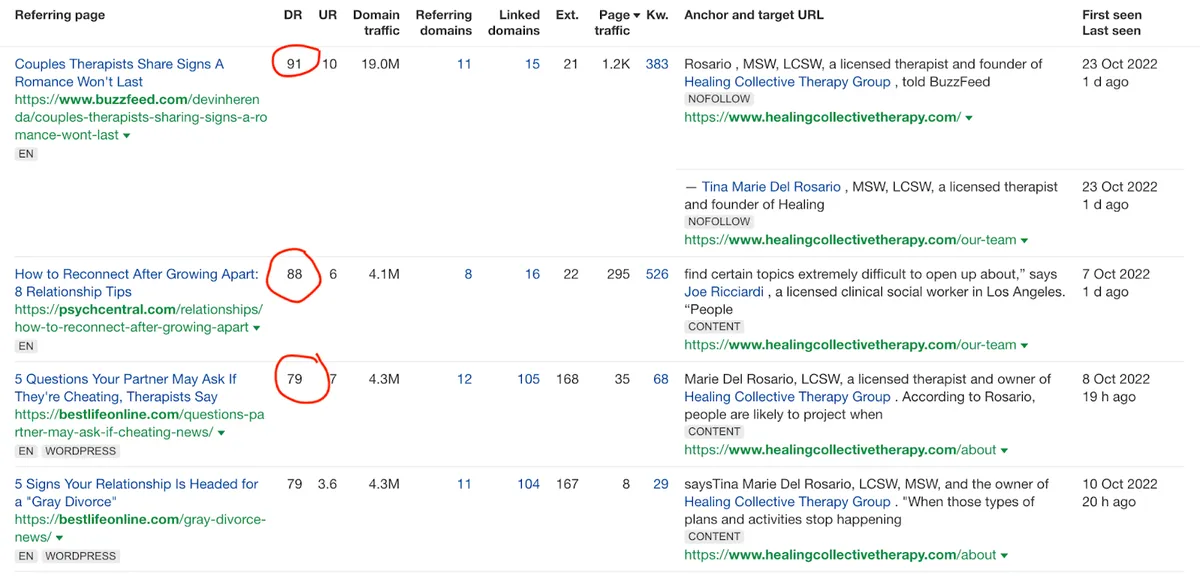
Do this as a routine for a razor-sharp competitive edge to your website's ranking ability.
Final thoughts…
To boost your search visibility, implement the same SEO tactics for YMYL websites. The YMYL SEO framework is simple: focus on page quality and prove credibility to gain trust. In other words, work on improving the E.E.A.T. of your website.
E.E.A.T. can be applied to all of your SEO endeavours-no matter what category your content falls under, so leave nothing to chance. Be meticulous with the things you can control.
Make use of every on-page optimization tactic in your arsenal. It’s putting together all of the little things that make a big impact on your search results. Everything mentioned above will work towards ranking ALL of your content successfully in the SERPs.
Related blog posts

From Setup to First LLM Insights in No Time
If you have not started tracking prompts yet, this is where to begin. We show you how to go from zero setup to first LLM insights in no time.
26 February 2026
How to Choose the Right AI Visibility Tool
Learn how to choose the right LLM tracking tool to monitor AI visibility. We go through key features, integrations, capabilities, and budget.
27 January 2026
5 LLM Visibility Metrics You Should Track in 2026
SEO is now both about ranking in search engines and being visible in LLMs. We give you five visibility metrics every SEO should track in 2026.
3 December 2025
